Blogging is super popular online, and it’s easy to see why. It allows you to make money from anywhere, anytime, even while you’re sleeping! Some bloggers, like me, actually start it as a side hustle and turn it into a full-time career after working hard for a few years.
With 66% of web traffic referrals coming from Google, blogging seems like the best choice for anyone aiming to achieve financial freedom.
But, like anything, blogging has its good and not-so-good sides. I’ve been blogging for 7 years, dealing with tech issues, writing late at night, and experiencing the thrill of seeing my monthly income hit five figures.
I get it – it’s not all sunshine and rainbows. There are some serious downsides to running a blog.
In this article, I’ve compiled a list of the pros and cons to help you figure out if blogging is your thing.
Table of Contents
Pros of Blogging
Thinking about starting a blog is pretty exciting! We could talk about it all day, but let’s keep it short and focus on these 11 benefits of blogging that are just as relevant today.
1. Build an Audience
Blogging can be a powerful tool for growing your audience, especially through building an engaged email list.
An engaged email list is incredibly valuable. Even if external factors like a Google penalty or changes in affiliate programs affect your website traffic, you still have a direct channel to your audience through email.
Your blog is a prime source for gathering quality email sign-ups. If you regularly publish content that satisfies user search intent, you’ll attract organic traffic from search engines. These visitors are actively seeking information and are more likely to engage with your articles.
To incentivize readers to sign up for your email list, you can offer them valuable content upgrades, free books, or email courses, known as lead magnets.
On your blog, you have full control over the call-to-action (CTA) design and offerings. This means you can experiment with different lead magnets and CTA designs to optimize your conversion rate and maximize sign-ups.
2. Make Good Use of AI Tools
In 2024, AI writing tools are changing the game for content creators. If you’re worried about losing your job to AI, starting a blog can actually help you thrive in this new era.
According to a survey by Authority Hacker, a whopping 79.3% of affiliate marketers are already using AI to create content.
Starting a blog allows you to leverage AI tools like ChatGPT. For example, you can ask ChatGPT to choose the best niche for your content.
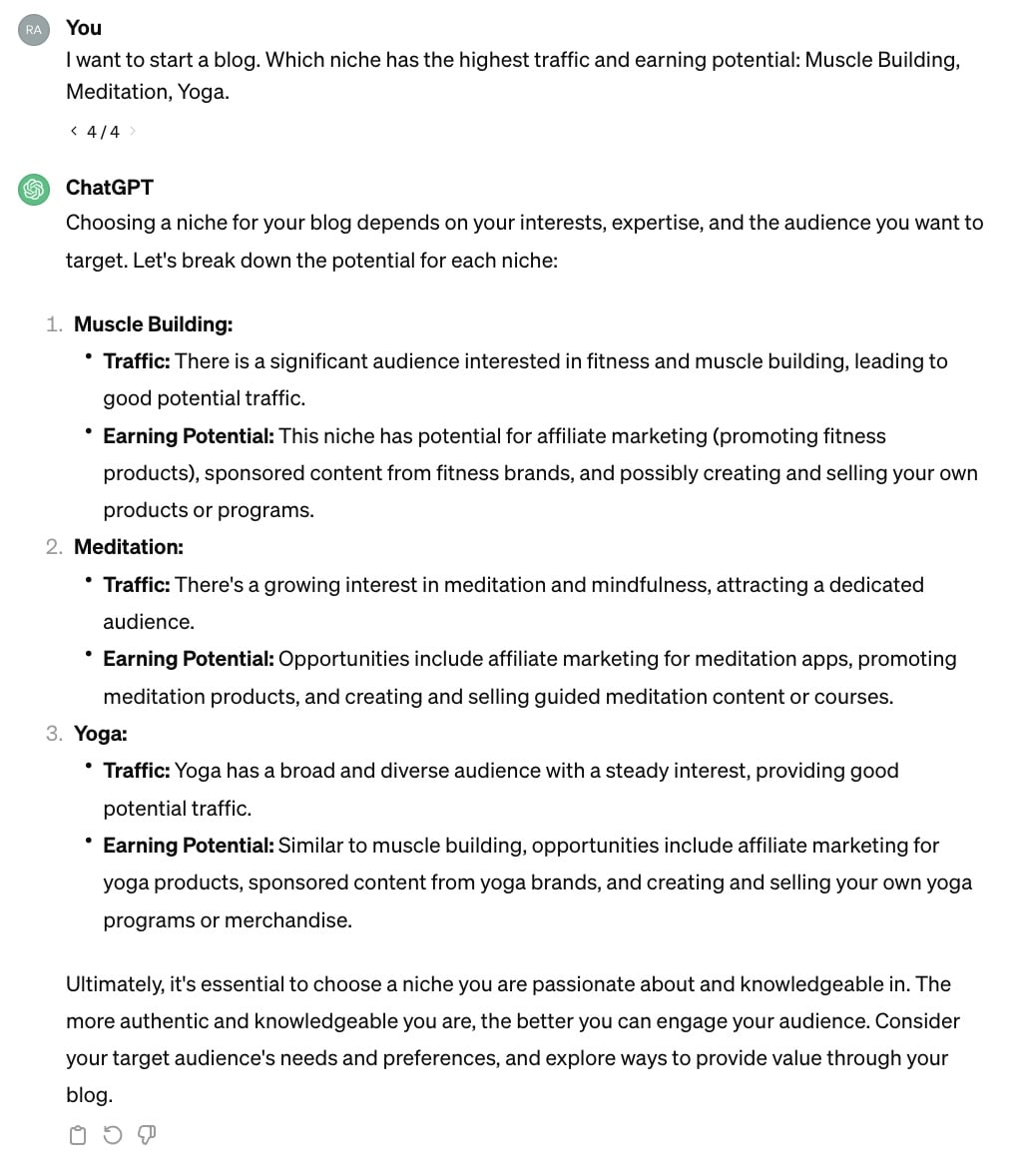
You can refine your questions until you have a solid content plan, and AI can even help you outline each post and suggest keywords.
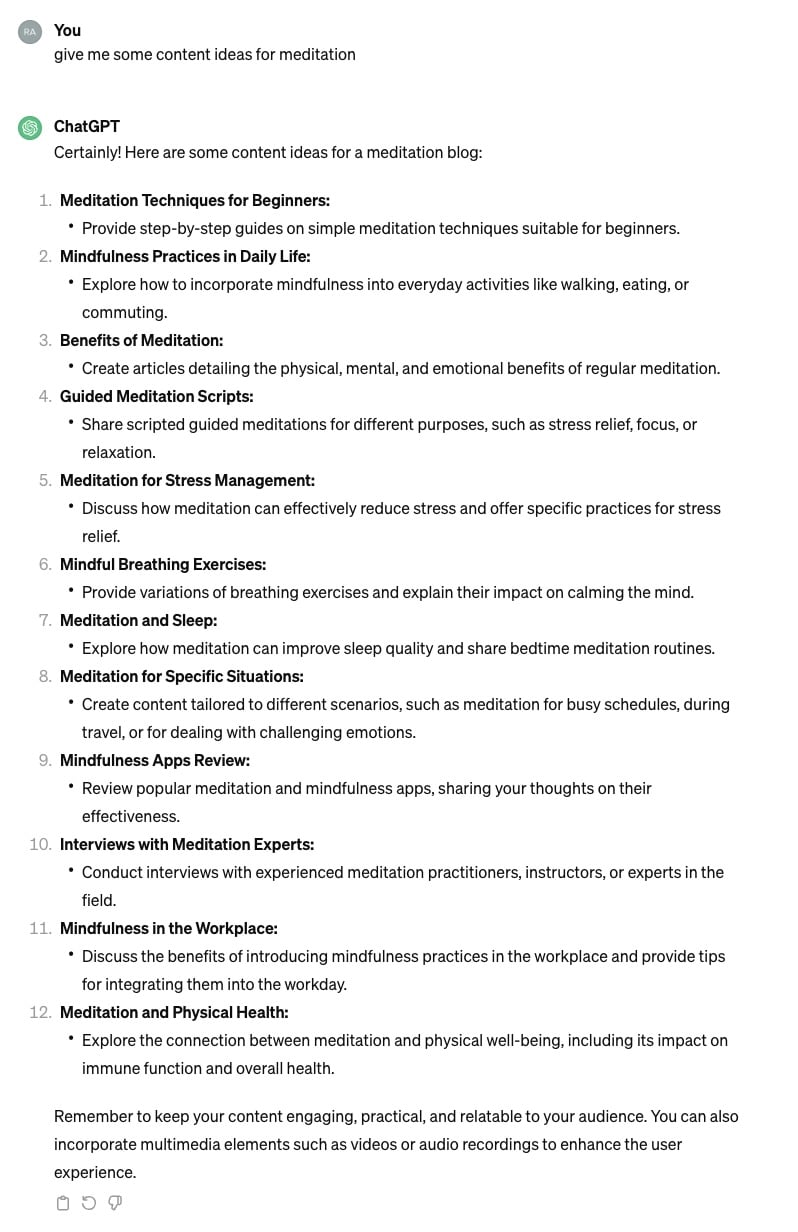
By using AI, you’ll be able to produce quality content faster than ever before, and you’ll stay ahead of the curve in the AI revolution.
3. Enhance Your Writing and Communication Skills
Writing well is important for effective communication in various situations and industries. In today’s digital age, where people spend a lot of time online reading articles, emails, Slack messages, and social media posts, the significance of good writing cannot be overstated.
While the internet can be a chaotic space, blogging offers a valuable opportunity to connect with people who share your interests, improve your analytical writing abilities, and distinguish yourself from the crowd.
Developing effective online communication skills can open doors to unexpected opportunities, as you never know who might be reading your content and what possibilities may arise.
4. Demonstrate Your Expertise
Even if you don’t feel like an expert, you probably know a lot about certain things. Sharing that knowledge through a blog is a fantastic way to highlight what you’re good at.
When you consistently create helpful content related to your blog’s main topic, you’ll start to be seen as an expert in that field. As your audience trusts you more, they’ll want even more from you—opening up opportunities to sell things like ebooks, online courses, or even get consulting jobs or a book deal.
Google really likes it when your content shows Experience, Expertise, Authority, and Trustworthiness (E-E-A-T). Basically, proving you know your stuff increases your chances of ranking high in searches and making money from your blog.
5. Build Your Own Brand
As your blog grows and people trust your knowledge, you’ll start to be noticed more online. Over time, readers will come to you for your expertise and unique viewpoint. The more loyal readers you have, the stronger your personal brand becomes.
Having a strong personal brand is like having a shield. It helps you face challenges in keeping and growing your audience, especially when things are always changing.
Look at Gaby Dalkin, the celebrity chef—she started as a food blogger in 2009. As her blog, What’s Gaby Cooking, gained more followers, she became well-known and successfully built her digital food media empire.
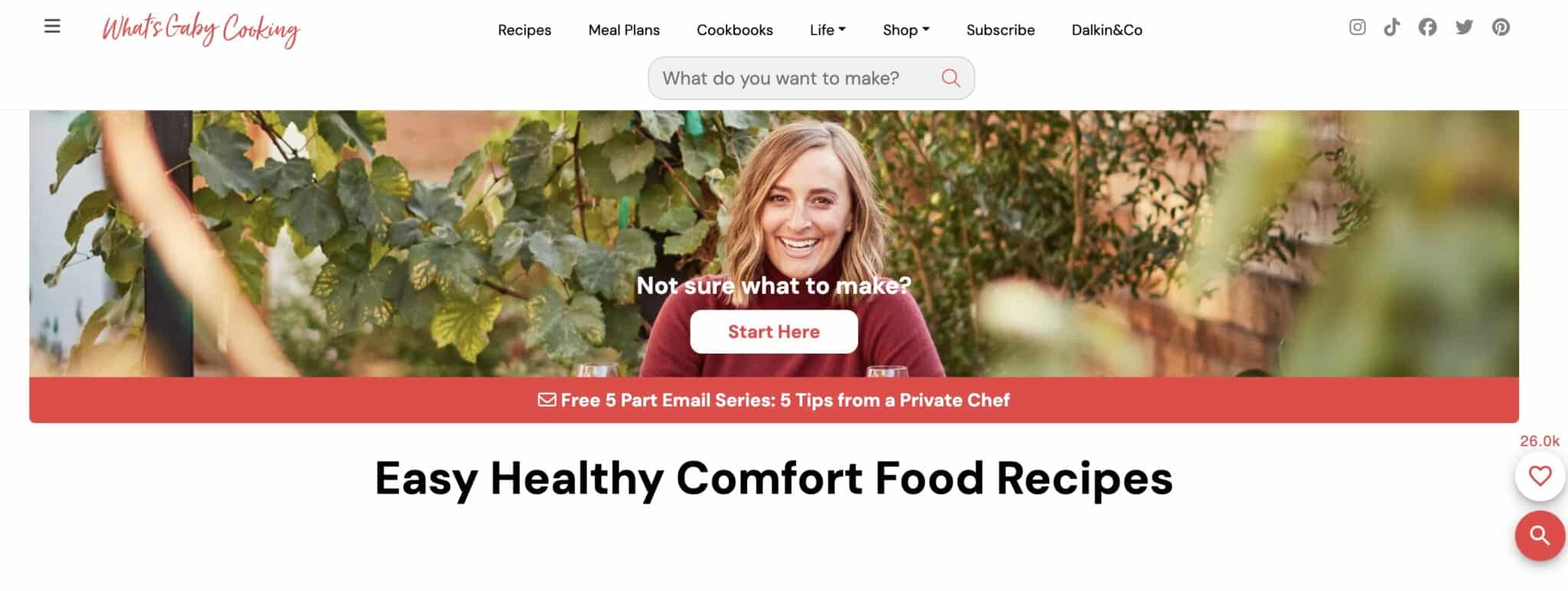
6. Earn Money Doing What You Love
Starting a blog isn’t just about sharing your passion—it’s also an opportunity to make money doing what you love. Blogging stands out among businesses because it offers various ways to earn money. Here are some popular methods in the blogging world:
-
Affiliate Marketing: Earn a commission by promoting other people’s products.
-
Display Ads: Get paid for displaying ads on your blog.
-
Selling Physical Products: Sell tangible items related to your blog’s theme.
-
Consulting: Offer your expertise to individuals or businesses.
-
Courses: Develop and sell online courses.
-
Email Marketing: Build a subscriber list and promote products or services.
This list is just the beginning! In our blog post on monetizing a blog, we explore these methods and more, helping you choose the ones that suit your blog best.
For inspiration, take a look at Imperfect Idealist, where Lily Fang writes about travel, running, sustainability and travel.
Lily openly shares details about her various income streams in her periodic blog income reports, giving you a real-world glimpse of the diverse ways you can make money through blogging.
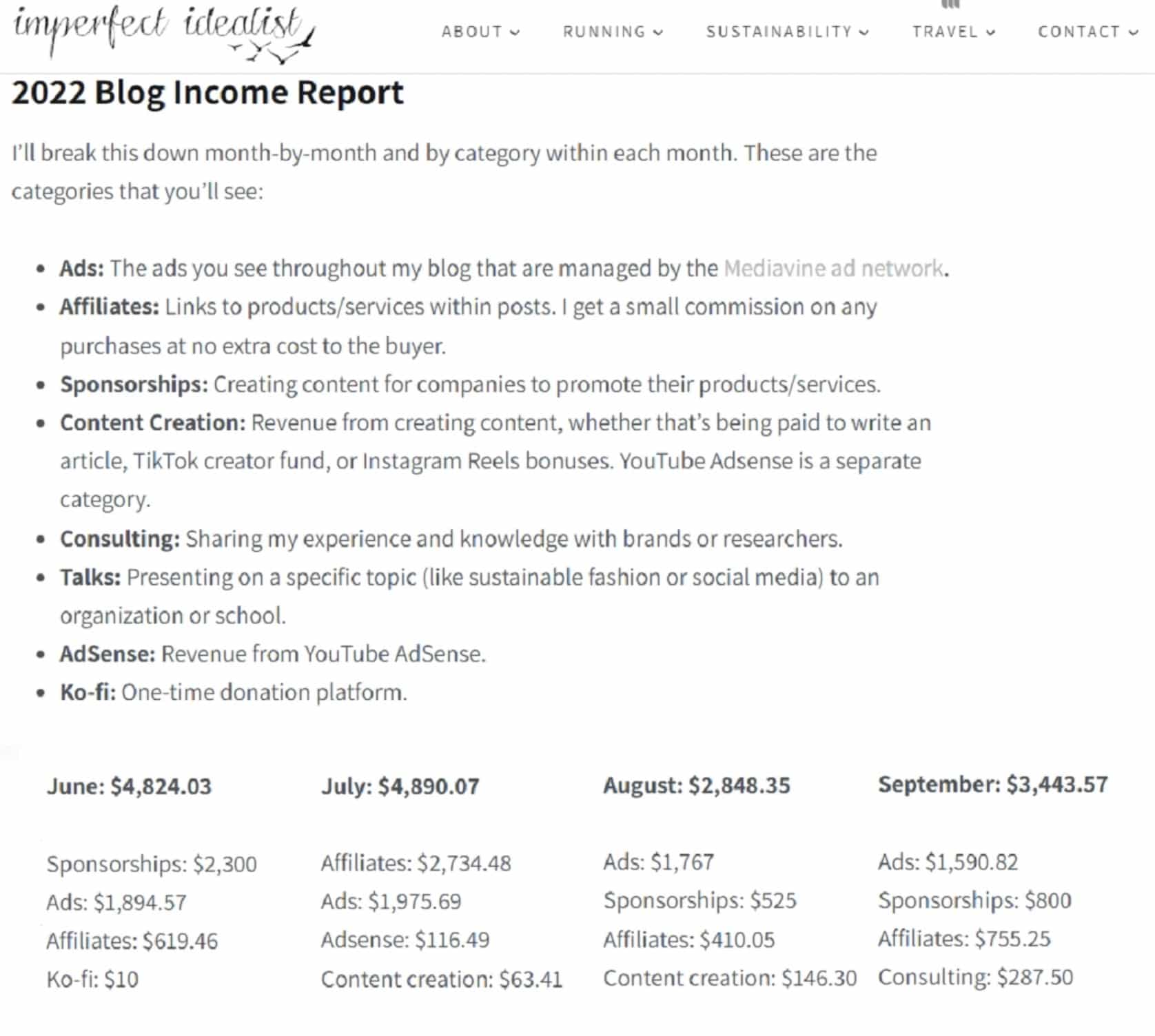
7. Build a Valuable Asset
As mentioned earlier, you can monetize a blog in different ways. But here’s an interesting twist – your blog can be like a valuable thing that you can sell later on if you want to.
A guy named Mushfiq Sarker from The Website Flip says that usually, websites sell for about 30 times the money they make in a month. This number might change based on things like how old the site is, what topic it covers, and if the money it makes is going up or down. But as a general idea, the multiplier is usually between 27 to 32 times.
For example, if your site makes $1000 every month, you might be able to sell it for $27,000 to $32,000. This shows that your blogging journey could actually be a good long-term investment.
If you’re curious to see real examples of how much blogs can be sold for, you can check out websites where people buy and sell them, like Empire Flippers, FE International, or even Flippa.
8. Flexible Lifestyle
Blogging brings awesome flexibility. You can work from cool places like a French café, a Thai beach, or just from home. It’s perfect if you love traveling and making money from anywhere. I’ve worked in amazing spots worldwide, and it feels great not being stuck in an office job.
This freedom isn’t just about where you work – it’s about how you work. You make the rules: set your schedule, choose topics to write about, and decide how much you want to work each week. Plus, no need for vacation requests – take time off whenever you want!
I started my first blog in 2014, quit my job in 2 years, and since then, I’ve been living life on my terms. I’ve traveled to Thailand, Cambodia, Vietnam, Indonesia, the Philippines, and more. I’ve even lived in some of these places.

9. Get More Organized and Productive
If you want your blog to succeed, you need to be organized and super productive. Since you’ll be putting out a lot of content, you’ll also have to handle social media, emails, and maybe even other writers.
As you work towards success, you’ll find the best tools and methods that suit not just your blog but also your style. And guess what? These tricks might make you more productive in other parts of your life.
For example, bloggers love using Trello to manage their content schedules. But it’s not just for blogs – lots of people use it for personal tasks. An engineer named Mitchell Fry even made a Trello template that helps over 80,000 people stay productive in their personal lives!

10. Grow Personally and Boost Confidence
Making a successful blog can boost your motivation and confidence in achieving your goals. To reach this point, you might need to learn new skills, develop habits, and change your mindset. Studies say it takes 18 to 154 days to form a new habit.
That’s why many bloggers have embraced content challenges. In these challenges, you commit to creating one piece of content every day for a set period, like 30, 60, or 90 days.
This challenge is an excellent way to kickstart your new blog. It also lets you connect with fellow bloggers who are starting their content marketing journeys.
Writing a post every day helps solidify your new writing habit and keeps you motivated to continue.
Cons of Blogging
Starting a blog in 2024 can be awesome for many reasons. But it’s not everyone’s cup of tea. Let’s look at some downsides to help you decide if blogging is not your thing.
1. Requires Continuous Adapting
Once you’ve created a successful blog that’s doing well and making money, your work doesn’t end there. Running a blog means you have to keep learning and adapting forever.
Google’s rules for ranking websites are always changing, and new competitors are joining the scene regularly. This means that keeping and improving your search engine rankings is an ongoing challenge.
For instance, in December 2022, Google made a change to its rules called the Search Quality Rater Guidelines. They added an extra “E” to the previous term E-A-T. So, what used to be E-A-T is now Google E-E-A-T. This new term stands for Experience (that’s the new E), Expertise, Authoritativeness, and Trustworthiness.
This means that bloggers now need to show firsthand experience in their product reviews. If a website only talks about the features of a product without personal experience, it has seen a significant drop in traffic. Honest Brand Review is a good example. Its authors only discuss the features and summarize Amazon’s user reviews. That’s why its traffic went down by over 90% since Google’s update.
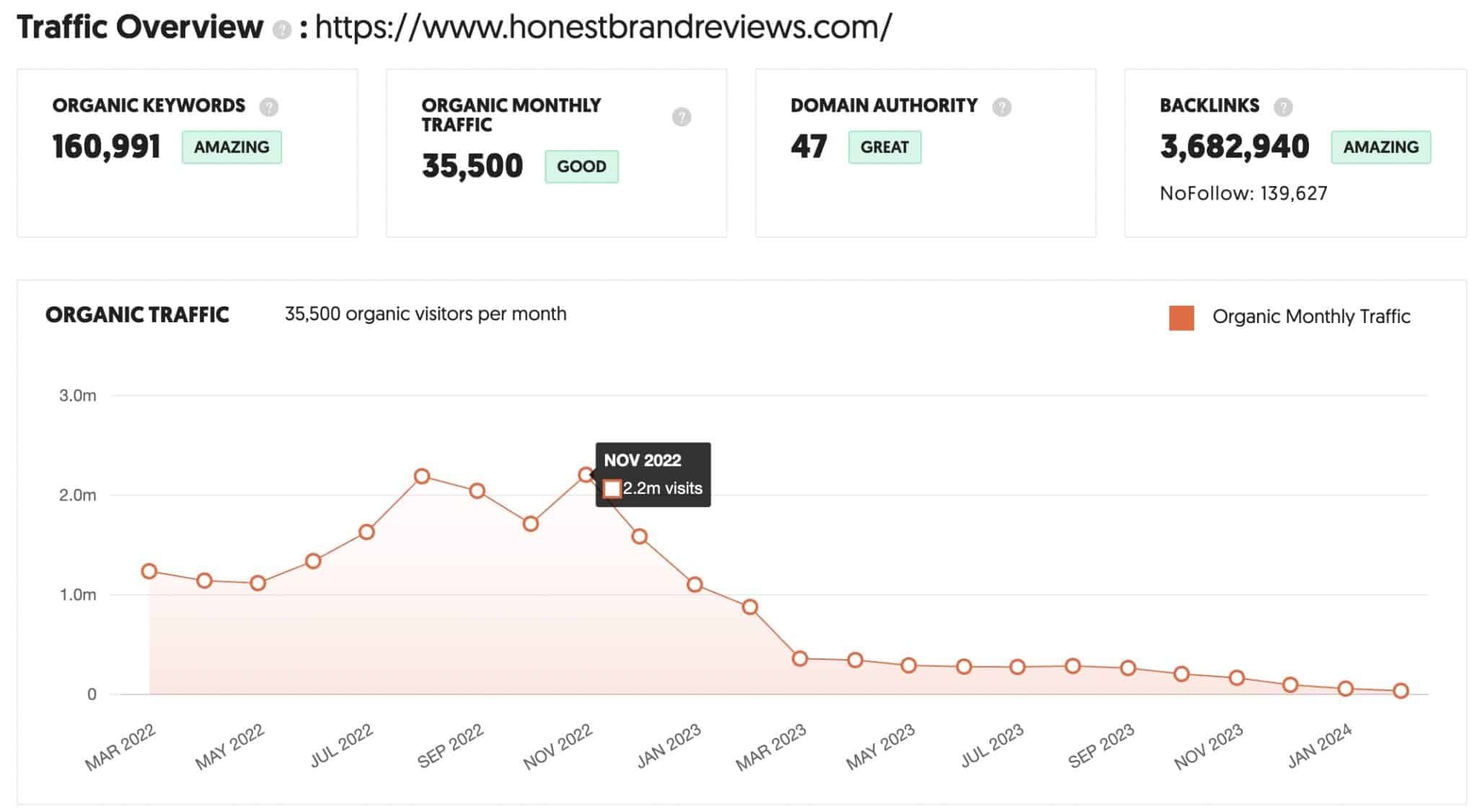
The technology used for blogging also keeps evolving, from big updates in platforms like WordPress to the rise of AI tools impacting various aspects of life.
As a blogger, you need to stay updated on these changes and figure out how to use them to your advantage. If not, you’ll fall behind.
Laws and regulations change too, and your blog has to adjust to stay compliant. For example, the United Nations states that 80% of countries have privacy laws in place or are considering them.
In simple terms, you can’t just set up your blog and forget about it. It requires constant attention and adjustment.
2. Hard to Balance Work and Personal Life
Starting a blog is often a part-time gig, with many bloggers working on it alongside their regular job. Even if some bloggers make a full-time income eventually, it usually begins as a side hustle. Successful bloggers often share a common story—they initially spent many hours during evenings and weekends on their blog.
In fact, I often spend more hours on my blog than a regular job. While it shows my dedication, it’s clear that blogging is time-consuming. You also need to handle admin tasks like finances, marketing, affiliates, and collaborations. It’s like juggling between being a creator, a marketer, and an entrepreneur.
Be careful, though; too much work can lead to burnout. So, finding the right balance between blogging and personal life is crucial.
3. Unpredictable Income
Blogging presents a unique challenge – there’s no guaranteed income. Imagine not having a regular paycheck; that’s the reality for bloggers. In my case, the earnings from my blog vary significantly from week to week and month to month. It’s noteworthy that I didn’t earn anything at all during the first 12 months.
A blogger’s income is usually a mix of affiliate marketing, ads, sponsored posts, and selling products or services. However, the catch is that the income is heavily influenced by the monthly blog traffic, which can fluctuate significantly. This variability often forces bloggers to diversify their income streams, adding more tasks to an already busy schedule.
Building a blog to the point where it generates a noteworthy income is a long-term game. Meanwhile, budgeting for day-to-day life becomes quite a challenge.
Until you reach that point of consistent income, financial planning remains unpredictable and requires careful consideration.
4. Intense Competition
Competition in blogging is much tougher now than it used to be. Back in the day, finding a niche with little competition was easy. You could quickly establish yourself as an authority by writing some basic articles.
But today, competition is fierce in almost every niche imaginable. Plus, with AI-generated content, even beginners can grow their blogs rapidly.
For instance, SEO expert Julian Goldie shared his experience scaling chipperbirds.com on Twitter. The Ahrefs graphs he posted show impressive results: the site gained 4000 new organic keywords in just a month.

And that’s just one example. Similar growth is happening all over the blogging world.
So, not only do you have to keep learning new skills, like using AI tools, but you also have to put in a lot of effort to create standout content.
5. Technical Challenges
If you’re not a tech whiz, dealing with the technical side of blogging can be a bit tricky. Even for someone like me, who’s decent with computers, starting a blog felt like diving into a sea of confusing tech stuff. It’s a steep learning curve.
You have to handle things like website hosting, maintenance, speed, domain management, and a bunch of other tech elements. For instance, setting up website hosting might involve choosing the right provider, understanding different hosting plans, and configuring server settings. Maintaining your site means regularly updating plugins, themes, and the WordPress core, which can sometimes lead to compatibility issues or even site crashes. Then there’s the constant battle to optimize your site’s speed for better user experience and search engine rankings.
When it comes to domain management, you’re responsible for renewing your domain registration on time and ensuring your domain settings are configured correctly, which can be confusing for beginners.
I’ve been stressed dealing with blog issues, especially in the beginning. My blog once crashed, and panic set in—I thought I might’ve lost months of hard work (luckily, it turned out fine!).
As you go along, these tech things become more manageable with practice and learning (remember the parts about skills and personal growth). But, especially at the start, it can be a tough and frustrating ride.
6. You Won’t Get Rich Quick With Blogging
Making money through blogging isn’t a quick fix for getting rich. It takes time and effort.
According to seo.co, it could take three to six months to show up on Google’s first page if your content is good and your site is optimized for search engines. But if there’s lots of competition or your site isn’t optimized, it might take longer, like six to 12 months.
When we say “optimizing your website,” we’re talking about three things: having good content, getting backlinks, and having a solid technical structure.
Getting a good ranking on Google is crucial for getting visitors to your blog. And you need consistent traffic to make money from ads, affiliate marketing, or other income sources.
But usually, it takes a while to start making decent money from your blog.
Conclusion
Even in 2024, blogging can still make you money and change your life.
Blogging gives you the freedom to be creative and help others. But starting a blog is harder now, with more people doing it every day. So, think about the good and bad sides of blogging before deciding if it’s right for you.
If you choose to start a blog, be patient. Success won’t happen overnight, especially if it’s your first blog.
But don’t worry, blogging success is still possible. You might even learn important life lessons along the way.
If you need more guidance, sign up for my online business coaching.

Jeff Smith, Founder of High Income Source, is an online business coach with a BBA in Marketing and Entrepreneurship from the University of Pennsylvania. His online business coaching program is so popular that more than 100 students have benefited and started successful online businesses under his guidance.
Jeff started dabbling in online business while he was in college, where he began with dropshipping. After college, Jeff worked at a marketing agency and freelanced as a writer. His breakthrough came when he realized the potential of blogging, leading to a $100,000 sale of a dog-focused website. His expertise includes SEO, affiliate marketing, Amazon FBA, blogging and dropshipping.